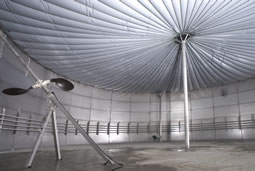The bio-gas plant manufacturer WELtec BioPower GmbH of Vechta, Germany was granted a construction permit to build the world's largest bio-gas plant, which will feed the bio-gas it produces directly into Germany's natural gas network.
 (01.06.2010) Together with some 30 farmers from the area surrounding the 8000-resident town of Könnern, the plant will produce some 30 million cubic meters of raw bio-gas per year. Some 15 million cubic meters of bio-methane can be produced in the bio-gas park between the cities of Halle and Magdeburg. The facility will ferment just over 120,000 tons of substrate annually. "The construction permit signals the beginning of the most ambitious project to date in our company's history," emphasized Jens Albartus, the company CEO. The substrates will consist mainly of renewable resources, such as feed corn, whole-plant ensilage (wheat and rye), as well as liquid cow and pig manure, alfalfa, and Sudan grass.
(01.06.2010) Together with some 30 farmers from the area surrounding the 8000-resident town of Könnern, the plant will produce some 30 million cubic meters of raw bio-gas per year. Some 15 million cubic meters of bio-methane can be produced in the bio-gas park between the cities of Halle and Magdeburg. The facility will ferment just over 120,000 tons of substrate annually. "The construction permit signals the beginning of the most ambitious project to date in our company's history," emphasized Jens Albartus, the company CEO. The substrates will consist mainly of renewable resources, such as feed corn, whole-plant ensilage (wheat and rye), as well as liquid cow and pig manure, alfalfa, and Sudan grass. | Copyright: | © Deutscher Fachverlag (DFV) |
| Quelle: | Entsorga China 01_2010 (Juni 2010) |
| Seiten: | 1 |
| Preis: | € 0,00 |
| Autor: | Thomas Wilkens |
| Artikel nach Login kostenfrei anzeigen | |
| Artikel weiterempfehlen | |
| Artikel nach Login kommentieren | |
Rechtliche und praktische Unsicherheiten bei der Durchführung des europäischen Klimaanpassungsrechts durch das Bundes- Klimaanpassungsgesetz (KAnG)
© Lexxion Verlagsgesellschaft mbH (6/2025)
In the context of the European Climate Law (EU) 2021/1119), the Governance Regulation (EU) 2018/1999 and the Nature Restoration Regulation (EU) 2024/1991, the KAnG came into force on July 1, 2024.
Transformatives Klimarecht: Raum, Zeit, Gesellschaft
© Lexxion Verlagsgesellschaft mbH (6/2025)
This article contends that climate law should be conceived as inherently transformative in a double sense. The law not only guides the necessary transformation of economy and society, but is itself undergoing transformation.
Maßnahmen zur Klimaanpassung sächsischer Talsperren
© Springer Vieweg | Springer Fachmedien Wiesbaden GmbH (5/2025)
Die Landestalsperrenverwaltung des Freistaates Sachsen (LTV) betreibt aktuell insgesamt 87 Stauanlagen, darunter 25 Trinkwassertalsperren. Der Stauanlagenbestand ist historisch gewachsen und wurde für unterschiedliche Zwecke errichtet.